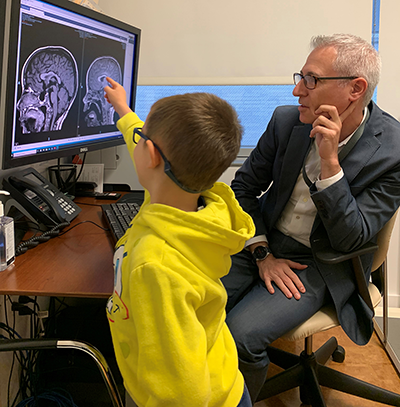
When I’m in my office seeing young patients for neurosurgical consultations, I am typically balancing two visits simultaneously.
One audience is always the parents. Listening to a doctor say that their child may need to undergo surgery to the brain or spine is one of the most worrisome things parents or guardians can hear. Addressing them as honestly and completely as I can is just part of the contract of being a pediatric provider — the more a parent understands about the risks and rewards, the better informed their decisions are, and the better equipped they are to face their child’s treatment and recovery. The trust parents need to feel to allow a surgeon to operate on their child is something one can’t experience until they are faced with that scenario — it can be terribly overwhelming.
Although the parents are making the ultimate decisions, it’s also essential that even young children have an age-appropriate understanding of what is happening in their body, what it looks like, and how I can help them. I find that children are much less frightened before surgery, and less traumatized by the whole experience, if they feel engaged and respected in the process. Whether it’s “getting rid of a boo-boo” for a toddler, giving a silly name to a tumor for a ’tween, or speaking more seriously with an older teenager, I love the process of engaging kids so they can understand we are partners in the decision making, and I find it essential to offer them a sense of being in control.
Deciding how to fall asleep in the operating room, debating how we’re going to style their hair, or choosing the music in the OR (which often means Taylor Swift) de-escalates the stress and allows kids to feel comfortable and safe.
In this photo, I am talking to seven-year-old Owen, whose parents brought him from Virginia to New York to get him the very best treatment from my team. Owen had been experiencing some difficult symptoms, tough for a kid to handle, but we were able to help. He loved seeing inside his head, and I loved talking to him about what was going on inside him and how we were going to take care of it.
Owen is doing great — his symptoms have resolved and he is happily back home in Virginia. He is excited about seeing this photo of himself with me, and I’m happy to share it here with his parents’ (and his!) permission.